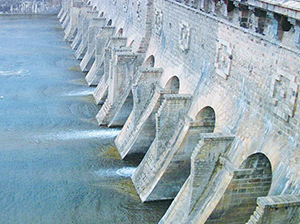New Delhi, Oct 17: A day before the crucial hearing on Cauvery dispute in the Supreme Court, a high level panel today suggested doing away with "outdated and unscientific water application techniques" to resolve the wrangle, saying both Karnataka and Tamil Nadu were facing water shortage, creating unemployment and financial hardship for the people.
The apex court-appointed Supervisory Committee, formed to inspect Cauvery basin to assess the ground realities in the region, said the neighbouring riparian states needed to appreciate interest of Tamil Nadu and Puducherry to protect their established irrigation and Karnataka's aspirations for development and educate their people accordingly.
The 9-member committee's report will come up for perusal before a three-judge bench of justices Dipak Misra, Amitava Roy and A M Khanwilkar which will hear a long pending appeal against the award of the Cauvery Water Dispute Tribunal and other related contentious issues arising out of the dispute.
The panel in its 40-page report has noted that farmers in both states were in severe distress and adequate crop compensation must be provided to them.
"There has been large number of suicides reported in Karnataka's Mandya district," the report said in its assessment of the social aspects of the situation in the Cauvery basin.
However, the technical assessment of the ground reality stated that "the water application techniques are outdated and unscientific and the value of water is not realised. The water applied to the field is on the concept of flooding from one field to another adjacent field and as such the water consumption is on the higher side and during period of distress, this becomes very significant depending upon the soil condition".
"The infrastructure to deliver water to the farmers is century old and has very low conveyance efficiency. This needs to be modernised for optimal use of scarce water. The conveyance efficiency can be further improved by piped distribution network and application efficiency by micro irrigation and precision irrigation.
"In addition, on-farm development works may be provided to ensure equitable distribution of water to individual farmer’s field," the report said.
The Supervisory Committee headed by G S Jha, chairperson of the Central Water Commission, agreed that both states have been facing water shortage and "in the absence of required water, the labour employment for farming and fishing is also limited, creating a scenario of unemployment and financial hardship to them".
"It has been seen from the data that this year is the consecutive low flow year. During the last five years it has been witnessed that three years are low flow years. In such a situation, the uncertainty prevails and farmers of the basin states suffer in the process...
"Both the States of Karnataka and Tamil Nadu need to appreciate interest of Tamil Nadu and Puducherry in protection of their established irrigation and Karnataka's aspirations for development respectively and should educate their people accordingly," the report said.
Karnataka has declared 42 out of 48 talukas under the Cauvery basin as drought-affected. The state has also been at the receiving end of at least six interim rulings by the apex court to release water to Tamil Nadu, which it has unwillingly complied with, it said.
The panel, after interacting with farmers and public representatives, also said that due to lack of water for irrigation in Karnataka, there is heavy impact on economy and many people have left villages seeking work in urban areas.
With regard to Tamil Nadu, it said agricultural labourers have been migrating from Cauvery Delta districts and many of them pushed to committing suicide due to financial burden.
Earlier, the bench had directed Karnataka to release 2,000 cusecs of Cauvery water per day to Tamil Nadu from October 7-18, while deferring its order asking the Centre to set up the Cauvery Management Board till it finally decided on appeals relating to the dispute.
It had also agreed to the suggestion that a Supervisory Committee, comprising officials and technical experts from the Centre, Tamil Nadu, Karnataka, Kerala and Puducherry, be set up to inspect the Cauvery basin for assessing the ground realities.





Comments
Add new comment